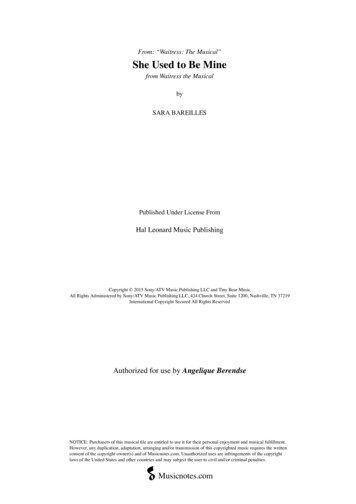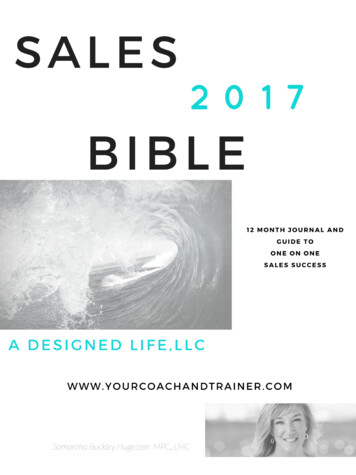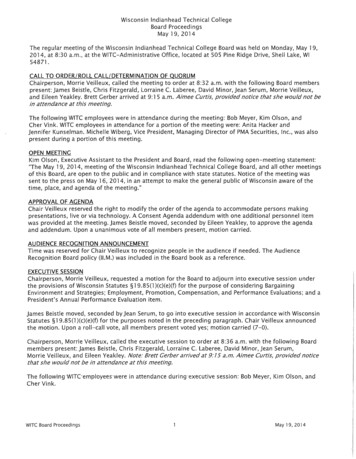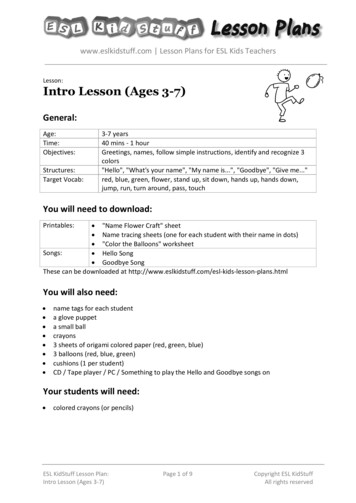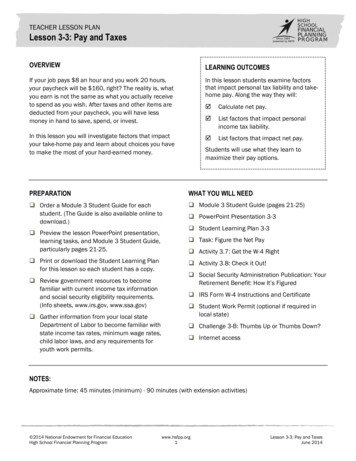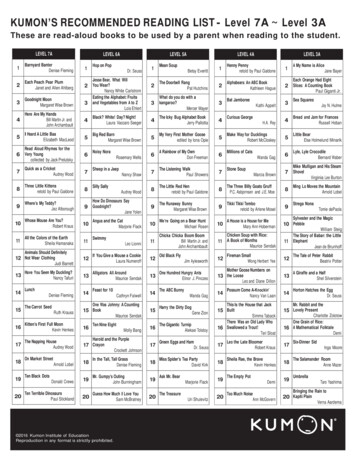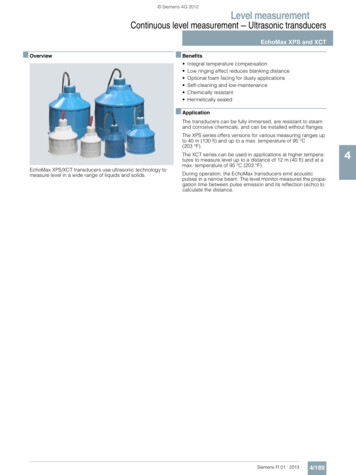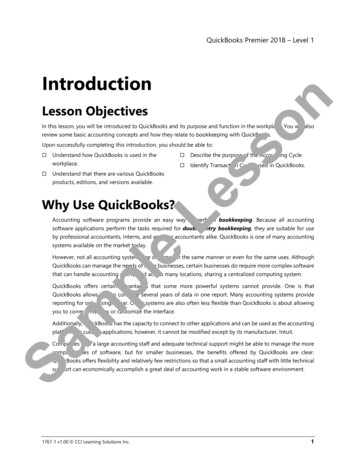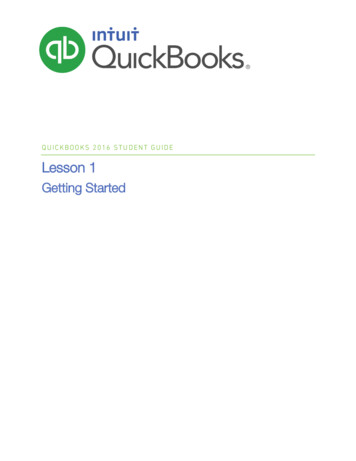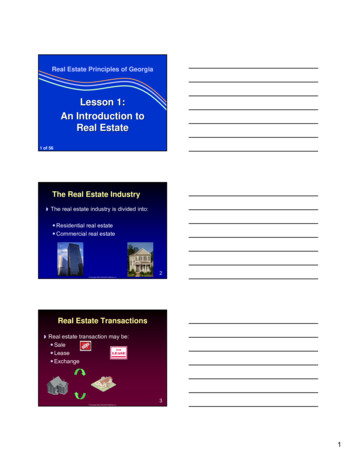
Transcription
Level 1Lesson 18She alwaysdoes thatTopicsPrepare Before ClassReacting to informationFacts or feelingsCards or paper strips with verbsPictures of foods that are familiar tostudents or the food images from thislessonOrdinal number cardsLearning StrategyGoalsGroupingGrammar: Describing frequency of actions;object pronouns; ordinal numbersSpeaking: Using the phrase ‘get it’Pronunciation: Object pronouns with /h/sound deleted (‘em; ‘im); two ways topronounce -s at the end of wordsDay 1Introduce the Lesson TopicAsk students, “Do you ever sort things -- like your pens and pencils, or foods in your kitchen?”Give students a chance to think of some examples. Some answers may include: cards,books, clothes or mail for a family.Use the images in the Resources section. Walk around and show the images to all of thestudents.Ask, “How many ways can we put these things into groups?” Listen for their answers andwrite them on the board. Examples may include:vegetables: carrots, potatoes, peppersfruits: apples, banana, orangeslong and thin: bananas, potatoes, carrotsLet’s Learn Englishround: oranges, applesred: peppers, potatoes, some applesorange: oranges, carrotsLesson 18181
Say, “In this lesson, we will see Anna’s boss, Caty, talk about something Anna always does.We also will see Caty sorting, or classifying, things. We’ll learn how to put things into groups,too. But first, let’s learn some new words.”Teach Key WordsHave students listen to the Speaking Practice video and say the new words for this lessonor repeat them after you.After the key words, the video teaches a new meaning for the verb “get.” The SpeakingPractice video explains that “get” can mean “to understand.” Here is the script:Speaking Practice Script – Lesson 181. Verb Phrase: get itWe often say we understand by using GET an object.Listen to Anna tell Caty she understands:Caty: This Is the News. Happy and sad arefeelings. You can’t have them in The News.Anna: Okay. I got it.2. Later, Caty says that Anna understandshow to read the news:Caty: Yes. Yes. That’s right! Now you’ve gotIt!Now, you try it. Do you understand thedifference between facts and feelings?Yes, I’ve ! (got it)Day 2Present the ConversationTell students that the video will show Anna doing something new at her job. Say, “Let’s findout what it is!”Play the main video. Tell students to respond when there are pauses in the video:Main Video Script – Lesson 181. Listen:Okay, let’s try the first story!She’s reading the second story.2. Listen:Let’s try the third story.Speak:Okay, let’s try the story! (first)She’s reading the story. (second)Speak:Let’s try the story. (third)Let’s Learn EnglishLesson 18182
Learning StrategyTell students that in today’s lesson, they will learn to put things into groups, or classify.Ask: “What happens when Anna reads the news?” Give them time to answer. Possibleanswers include, “Anna shows her feelings” and “Caty gets angry.”Explain, “Caty wants Anna to understand the difference between facts and feelings. Noticehow she says it.” Write this on the board:When we read the news we are always reading facts. We never show our feelings.Point out the structure of the sentence. It is:Subject – Frequency adverb – Verb.Give the following examples and underline the frequency adverbs always and sometimes:We always speak English in this class.I sometimes ask students to answer difficult questions.Say, “You can also group things when you learn English. Grouping helps us to organizewords and patterns so we can remember things more easily. Today we’re going topractice.”Practice GroupingCut out one set of the word cards from the Resources section and place them on a fronttable. Bring two students to the front of the class to show the activity. Write the wordsalways, sometimes, and never on the board in three columns, like this:alwayssometimesneverAsk one student, “What do you always do on weekends? Pick a card.” Let the student picka verb card. On the board, make a sentence with the verb and always:He always sleeps on the weekend.sleepWrite the word sleep under the adverb always on the board. Encourage the student to asktheir partner, “What do you sometimes do on the weekend?” When the partner answers,write their sentence on the board, write the word “shop” under the word “sometimes.”I sometimes shop on the weekend.shopLet’s Learn EnglishLesson 18183
Have the other student ask a question with “never. “Tell students to cut out copies of the“Actions” images that you can find in the Resources section. Have them place the cut-outpapers with the adverbs always, sometimes, and never at the top of their desk or table.Tell students to work in pairs. Tell them, “Take each of the verb cards and place them underthe word that tells how often you do the activity. Say whether you do it always, sometimes,or never. Ask your partner questions about each activity and answer your partner’squestions.”Ask several students to show how they used the verbs and adverbs. Ask one pair totalk about how their partner spends the weekend differently. “She always relaxes on theweekend. I always work on the weekend. I never cook on the weekend. She sometimescooks.”Day 3Activity SheetSay, “Today, we are going to practice a kind of numbers called ‘ordinal numbers.’ Thesenumbers show a position or placement of people or things.”Tell students, “In this lesson, Caty uses ordinal numbers to tell Anna which story to read.For example, she says ‘Okay, let’s try the first story!’ First is an ordinal number.”On the board, draw two airplanes traveling in the same direction. Be sure one is behind theother to show which is moving faster. Say, “This airplane is first. This airplane is second.”Tell students that ordinal numbers sometimes look and sound like regular numbers. Forexample, “eighth” does sound like “eight.”But sometimes they do not look or sound like regular numbers. For example, “first” doesnot sound like “one.”Give students the ordinal number cards (from the Resources section) and the crosswordpuzzle Activity Sheet. Ask them to work in pairs, using the cards to help get the crosswordanswers. Students then do the second part of the sheet with their partners, writingsentences about what the characters do.Review the crossword answers and sentences as a class. Ask each pair to share onesentence they have written with the class.Let’s Learn EnglishLesson 18184
Pronunciation PracticeTell students they will practice the shortened sounds of some English words.The Pronunciation Practice video teaches how to pronounce shortened future forms. Hereis the script:Pronunciation Practice Video Script – Lesson 181. Shortened “h” and “th” sounds2. Two sounds for “s” endingsIn slow speech, English speakers pronouncethe “h” or “th” in words like “him,” her” or“them.”When we use a verb with he, she or it, the“s” at the end of the verb usually sounds likethis: He walks / She talks / It helps.In fact speech, we sometimes do not saythe first sound. In writing, it looks like this:‘im” ‘er” ‘em.”Sometimes, the “s” at the end of the verbsounds like /z/.When the verb ends with /b/ /d/ /g/ /l/ /m//n/ /ng/ /r/ or with a vowel sound /a/ /e/ /i//o/ /u/, pronounce “s” as /z/.Listen to Anna speak carefully about theduckling. The duck’s mother cannot findhim.Listen to Anna tell about the car race:Anna: It is about a lost duckling. The duck’smother cannot find him.Then, she speaks quickly about theduckling.Anna: It is about a lost duckling. The duck’smother cannot find ‘im. But a family giveshim a home.Now, you try it.English has many words. I’m learning manyof . (‘em)Anna: Right, but it is awesome that an80-year-old grandmother wins a car race.And about the driver:Anna: In Indiana, a grandmother Is the first80-year-old woman to win the Race Car 500.She rarely talks to reporters. But when shedoes, she often says, “Nothing can stop menow!”Now, you try it:Anna reads the news.Caty tells Anna about feelingsLet’s Learn EnglishLesson 18185
Day 4Listening QuizGive each student a paper copy of the listening quiz. Play each question’s video and pausefor students to answer. Ask students to choose the correct answer.If not using the video, read the sentences below aloud:1. Caty says, “Now, Anna, remember. When we read the news, we are alwaysreading facts. We never show our feelings.”2. Anna says, “A new book is very popular with children and families. This is it. It isabout a lost duckling.”3. Caty says, “Anna, when you say the words “duck” and “duckling” you look reallysad.” Anna says, “I do?” Caty says, “Yes. Sad is a feeling.” Anna says, “Sad is not afact.”4. Anna says, “Hello, and welcome to The News. In Indiana, a grandmother is thefirst 80-year-old woman to win The Race Car 500. Anna: That is awesome!” Catysays, “Stop! Stop! Anna, please -- no feelings.”Collect the papers or ask students to trade papers and check the answers together.WritingDiscuss the words that may be used for the topic. Write some of them on the board forstudents to use in their written work.Say, “In this lesson, Anna is nervous because she is reading the news for the first time.How do you feel when you do something for the first time?”Then, write the writing topic on the board:How do you feel when you do something for the first time?Write a few sentences about it. Use “always” “sometimes” or “never.”Let’s Learn EnglishLesson 18186
nna:Caty:Anna:Caty:ConversationNow, Anna, remember. When we read the news we are always reading facts. Wenever show our feelings.Sure thing, Ms. Weaver.Great. Are you ready?Yes.Okay, let’s try the first story!Hello, and welcome to The News.A new book is very popular with children and families. This is it.It is about a lost duckling. The duck’s mother cannot find him.Stop! Anna, when you say the words “duck” and “duckling” you look really sad.I do?Yes. Sad is a feeling.Sad is not a fact. Sorry. Let me try again.Okay, she’s trying again! And go.Hello, and welcome to The News. A new book is very popular with children andfamilies. This is it.It is about a lost duckling. The duck’s mother cannot find ‘im. But a family giveshim a home.Stop! Anna, you are doing it again.This story is very sad.I have an idea. Let’s read the second story. She’s reading the second story. And go!Hello , and welcome to The News. In Indiana, a grandmother is the first 80-year-old woman to win The Race Car 500.That is awesome!Stop! Stop! Anna, please -- no feelings.Right. But it is awesome that an 80-year-old grandmother wins a car race.Just the facts, Anna.Right.Hello, and welcome to The News. In Indiana, a grandmother is the first 80-year-oldwoman to win The Race Car 500.She rarely talks to reporters. But when she does, she often says, “Nothing canstop me now!”I am very happy for her!Stop, stop, stop!! Anna, you cannot say you are happy.But I am happy.But you can’t say it.Why?This is the News. Happy and sad are feelings. You can’t have them in The News.Let’s Learn EnglishLesson 18187
Anna: Okay. I got it.Caty: Okay. Let’s try the third story. She’s reading the third story!Anna: Hello and welcome to The News. City politicians in Big Town are using city moneyto have a big party on a cruise ship. They are taking the money for the party fromthe children’s library.Anna: What?! That makes me very angry.Caty: No, no, no! Anna, you cannot say you are angry! This is The News!!!Anna: What can I do, Ms. Weaver? Take out my feelings and put them here on thenews desk?Caty: Yes. Yes. That’s right! Now you’ve got it!Caty: Let’s repeat the first story.Anna: This is going to be a very long day.Anna: Until next time!Let’s Learn EnglishLesson 18188
Key Wordsangry – adj. having a strong feeling of being upset or annoyedcruise ship – n. a large ship that stops at different ports and carries passengers who aretraveling for pleasuredesk – n. a piece of furniture that is like a table and often has drawersduck – n. a bird that swims and has a flat beak, a short neck, a heavy body, short legs, andwebbed feetduckling – n. a young duckfact – n. a true piece of informationfeeling – n. an emotional state or reactionget – v. to understand (something or someone)Indiana – n. state of the U.S.long – adj. lasting or continuing for a great amount of timelost – adj. not knowing where you are or how to get to where you want to gopopular – adj. liked or enjoyed by many peoplerace car – n. a very fast car that is used in professional auto racingrarely – adv. not very oftenrepeat – v. to say (something) againsad – adj. not happystory – n. a description of how something happenedwin – v. to achieve victory in a fight, contest, game, etc.Let’s Learn EnglishLesson 18189
Quiz - Level 1, Lesson 18 - She Always Does ThatListen. Circle the letter of the correct answer.3. What happens when Anna says “duck”and “duckling”?1. What does Caty tell Anna to do?a. She tells Anna to read only the facts.b. Caty wants Anna to read fast.c. She wants Anna to read with morefeeling.d. Caty tells Anna to read louder.a. Anna is happy because she is telling thefacts.b. She looks at the book.c. Anna looks sad because she is showingher feelings.d. She starts to read to Caty.2. Why is Anna talking about the book?a. The book is about a boy who is lost.b. It is a book for lost children.c. The book is the first one about aduckling.d. Many children and families are readingthe book.Let’s Learn English4. Why does Caty stop Anna?a. Anna made a mistake - it is a 70-year-oldgrandmother.b. Caty wants Anna to stop showing herfeelings.c. Anna is reading the story too fast.d. Caty does not think the grandmother isawesome.Lesson 18190
Fruits and VegetablesLet’s Learn EnglishLesson 18191
Ordinal Number CardsLet’s Learn thNinthTenthLesson 18192
Let’s Learn EnglishLesson 18193
Actions and AdverbsLet’s Learn EnglishLesson 18194
Give the following examples and underline the frequency adverbs always and sometimes: We always speak English in this class. I sometimes ask students to answer difficult questions. Say, “You can also group things when you learn English. Grouping helps us to organize words and patterns so


